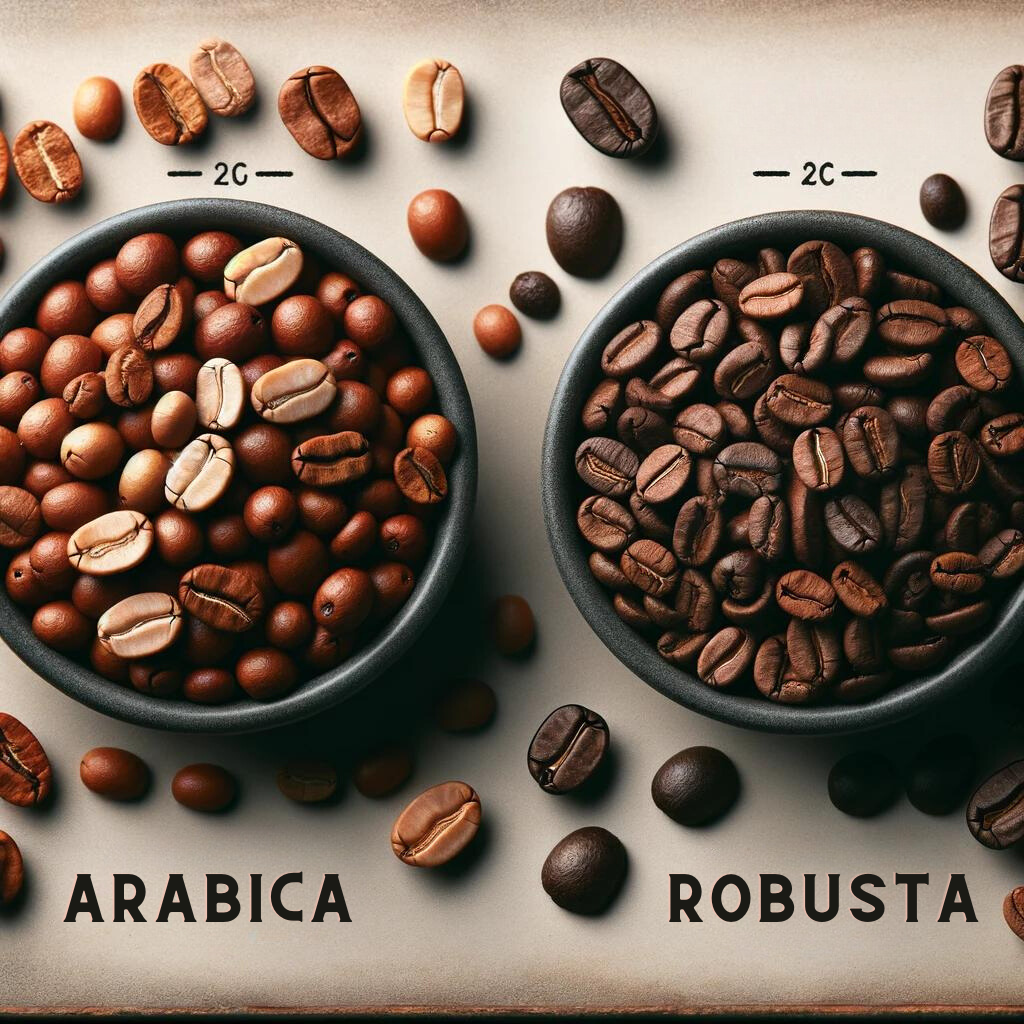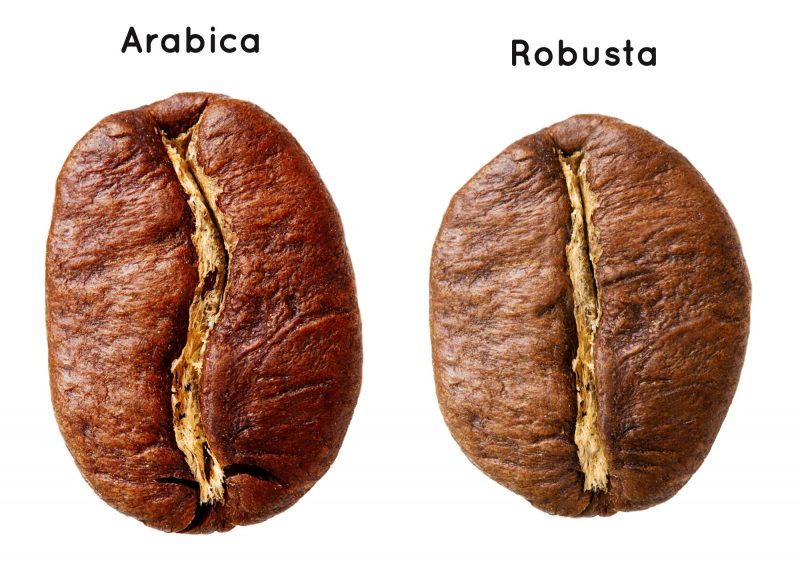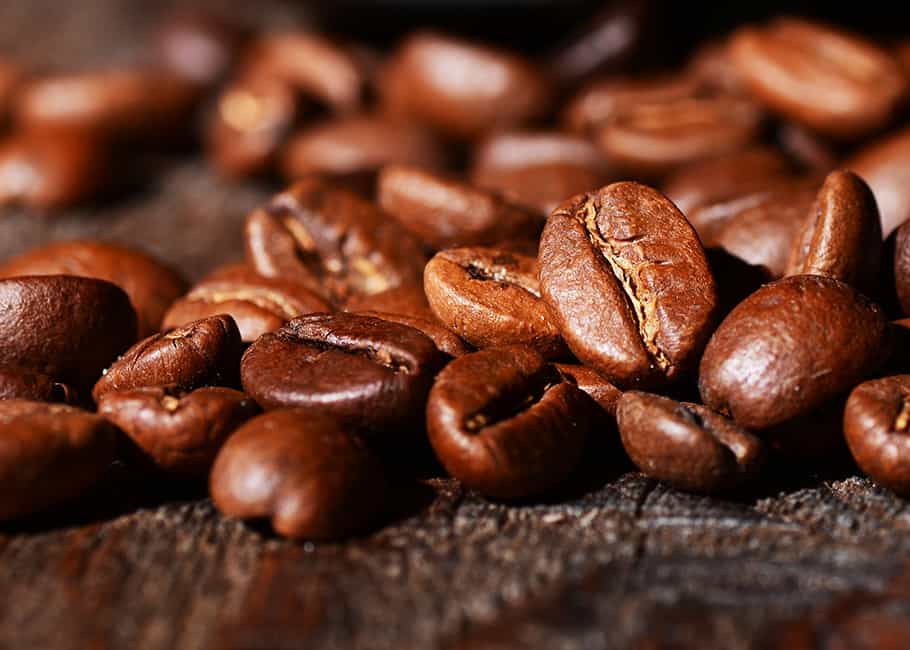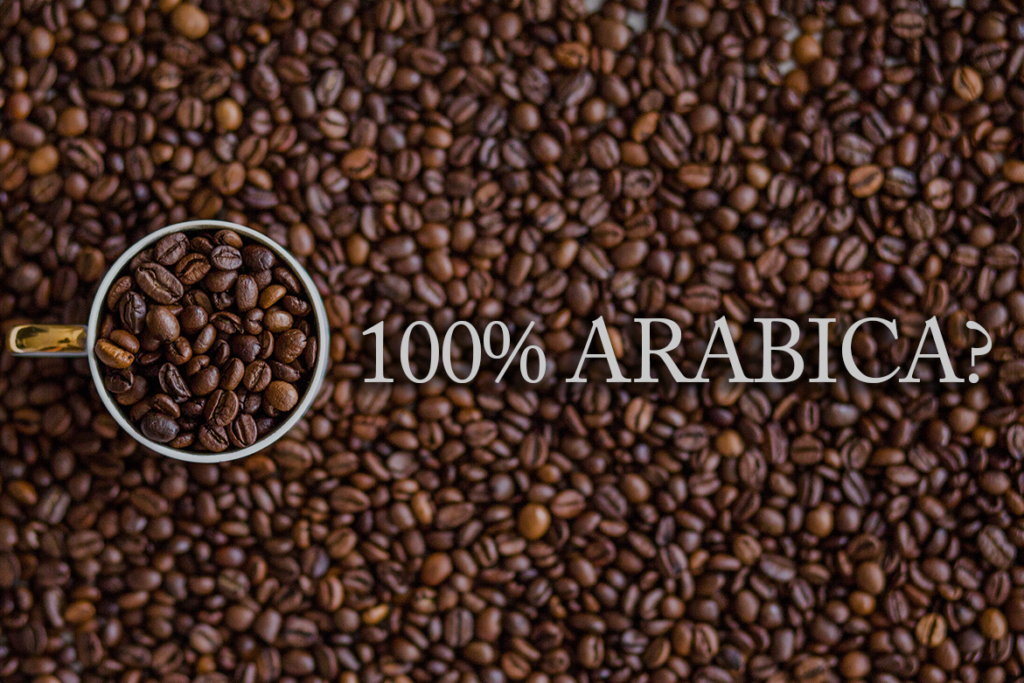Did you know that coffee belongs to the Rubiaceae family, with over 500 Genera and 6,000 species? Two prominent members are Arabica and Robusta beans, each with unique characteristics and flavors. Explore the intriguing world of Arabica vs. Robusta in this comprehensive guide!
What are Arabica and Robusta Coffee Beans?
Arabica and Robusta are two of the most widely consumed coffee bean varieties in the world. Arabica coffee (Coffea arabica) is known for its delicate flavor and pleasant aroma. It is often described as having a sweet and soft taste, with hints of fruit and chocolate. On the other hand, Robusta coffee (Coffea canephora) is known for its strong and bold flavor, with a sharp and tangy taste. It is often described as having an oatmeal-like taste with a slightly bitter aftertaste.
Taste Profiles: Arabica vs Robusta

When it comes to taste, Arabica and Robusta coffee beans offer distinct flavor profiles. Arabica beans are known for their complex and nuanced flavors, making them a favorite among coffee connoisseurs. They are often described as having a well-balanced acidity, with notes of sweetness and a smooth finish. Robusta beans, on the other hand, have a stronger and more robust flavor. They are often used in espresso blends to add body and crema. Robusta beans are known for their higher caffeine content, which contributes to their bold and intense flavor.
Flavor Profile Comparison
Arabica Coffee Flavor Profile
Arabica coffee is often described as the wine of coffees. It’s known for its delicate and nuanced flavors that can range from sweet soft berries to rich chocolate. The higher acidity level in Arabica coffee gives it a bright and vibrant taste that many coffee lovers adore.
Robusta Coffee Flavor Profile
Robusta coffee, true to its name, offers a robust and full-bodied flavor. It’s typically more bitter than Arabica, with earthy and nutty undertones that can be quite pronounced. If you’re looking for a coffee with a strong kick, Robusta might be your go-to.
Caffeine Content
Arabica Coffee Caffeine Content
Arabica coffee is generally lower in caffeine, with about 1.2% caffeine content on average. This makes it a popular choice for those who prefer a milder caffeine kick or are sensitive to caffeine.
Robusta Coffee Caffeine Content
Robusta coffee, on the other hand, packs a punch with its caffeine content. It contains about 2.2% caffeine on average, making it a favorite among those who need a strong caffeine boost to start their day.
Price Differences: Arabica vs Robusta
The price of Arabica and Robusta coffee beans can vary significantly. Arabica beans are generally more expensive due to their higher quality and more demanding cultivation requirements. The delicate nature of Arabica plants makes them susceptible to diseases and pests, which can affect the yield and drive up the price. Additionally, Arabica beans are often hand-picked, adding to the labor costs. On the other hand, Robusta beans are more affordable because they are easier to cultivate and have a higher yield. They are often used in commercial blends and instant coffee products.
Shape and Size
Arabica coffee beans are typically larger and have an elongated shape, while Robusta coffee beans are smaller and rounder. This difference in shape and size can affect the brewing process and the overall taste of the coffee.
Antioxidants and Health Benefits
Arabica Coffee Antioxidants
Arabica coffee is rich in antioxidants, which are known to protect the body against free radicals and may reduce the risk of chronic diseases. It’s not just a delicious beverage, but also a healthful one.
Robusta Coffee Antioxidants
While Robusta coffee may have fewer antioxidants than Arabica, it still offers some health benefits. The antioxidants present in Robusta coffee can contribute to overall well-being and may have positive effects on certain health conditions.
Other Key Differences
There are a few other differences between Arabica and Robusta coffee that are worth mentioning.
Fats & Sugars
Arabica coffee generally has lower fat and sugar content compared to Robusta coffee. This can be beneficial for those who are watching their calorie intake or have specific dietary restrictions.
Cultivation Methods
The cultivation methods for Arabica and Robusta coffee differ slightly. Arabica coffee is often grown using traditional and more labor-intensive methods, while Robusta coffee is often cultivated using more mechanized and efficient techniques.
The New Face of Robusta: Specialty Coffee
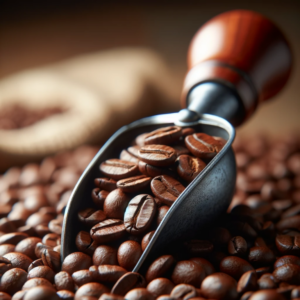
Robusta’s reputation is evolving, with specialty coffee enthusiasts uncovering its potential. From espresso blends to unique brewing methods, Robusta’s bold flavors and robust crema are gaining recognition. Specialty Robusta, grown with care, challenges preconceived notions and takes coffee experiences to new heights.
Robusta’s Resurgence
As the specialty coffee movement expands, Robusta emerges from the shadows. Roasters experiment with its unique characteristics, producing fine Robusta offerings that challenge perceptions. With a distinctive taste profile and heightened caffeine, Robusta might just become the next sensation in the coffee world.
The Unconventional Charm of Robusta
Robusta’s charm lies in its uniqueness. While often considered less refined, Robusta boasts strong crema, bold flavors, and a distinct presence. As the coffee community questions old beliefs, specialty Robusta emerges as an avenue for exploration. Embrace Robusta’s robust character and discover its potential in new and exciting ways.
The History and Origins of Arabica and Robusta Coffee
Arabica, with varieties like Typica and Bourbon, offers a smoother, sweeter taste with hints of chocolate and fruits. Robusta, known as Coffea Canephora, boasts a bolder, bitter taste with a stronger caffeine kick. These coffee cousins vary not just in species, but also in the flavor profiles influenced by growth conditions and terroir.
Arabica coffee is believed to have originated in Ethiopia and is the oldest known coffee species. It was later introduced to other parts of the world, including the Arabian Peninsula, hence its name. Robusta coffee, on the other hand, is native to Central and Western Africa and was discovered much later than Arabica coffee.
Growing Environments: Arabica vs Robusta
Arabica and Robusta coffee beans thrive in different growing conditions. Arabica beans are typically grown at higher altitudes, ranging from 2,000 to 6,000 feet above sea level. They prefer cool subtropical climates with consistent rainfall. These beans are more delicate and require specific conditions to flourish. On the other hand, Robusta beans are grown at lower altitudes, usually below 2,000 feet above sea level. They can withstand warmer temperatures and are more resistant to diseases and pests. Robusta plants are known for their hardiness and adaptability to different environments.
Growing Conditions
Arabica Coffee Growing Conditions
Arabica coffee is a bit of a diva when it comes to growing conditions. It prefers higher altitudes, typically between 2,000 to 6,000 feet above sea level, and a cooler climate with consistent rainfall and shade. It’s a delicate plant that requires careful attention and nurturing.
Robusta Coffee Growing Conditions
Robusta coffee is more resilient and can withstand a wider range of growing conditions. It’s typically grown at lower altitudes, between 200 to 800 feet above sea level, and thrives in hotter climates with higher humidity. It’s a hardy plant that can resist diseases and pests more effectively than Arabica.
Arabica vs. Robusta FAQs
Arabica and Robusta are more than just coffee beans; they’re gateways to distinct worlds of taste and aroma. From the heights of Arabica’s delicate elegance to the resilience of Robusta’s bold flavors, exploring these differences unveils a realm of possibilities for coffee lovers seeking exceptional experiences.
Which one is better Arabica or Robusta?
The preference between Arabica and Robusta largely depends on individual taste and the desired coffee experience. Arabica beans are often considered superior in taste due to their smoother, sweeter flavor profile with hints of chocolate and fruit. Robusta, with its bold bitterness and higher caffeine content, is commonly used in espresso blends and for its crema production. Both beans have their unique qualities, and the “better” choice varies based on personal preferences.
Why do people drink robusta coffee?
People drink Robusta coffee for several reasons. Robusta beans have a stronger, more bitter taste than some individuals prefer, especially when combined with milk or in espresso blends. Robusta’s higher caffeine content also attracts those seeking a more intense caffeine kick. Additionally, Robusta’s resilience to pests and diseases makes it a practical choice in regions where Arabica struggles to thrive, contributing to its availability and popularity.
Why is Robusta cheaper than Arabica?
Robusta coffee tends to be cheaper than Arabica due to several factors. Robusta plants are hardier and more disease-resistant, leading to higher yields and lower production costs. The plants can be grown at lower altitudes and are less vulnerable to pests, resulting in a more cost-effective cultivation process. Arabica’s delicate nature and susceptibility to pests and diseases contribute to its higher production costs, making it relatively more expensive than Robusta.
Arabica or Robusta: try both!
Now that you know the key differences between Arabica and Robusta coffee, it’s time to explore and find the one that suits your taste and brewing preferences. Whether you prefer the delicate flavors of Arabica or the boldness of Robusta, we have a wide selection of high-quality Arabica and Robusta coffee beans for you to choose from. Join our newsletter to stay updated on the latest coffee trends and promotions, and explore our brewing guides to learn how to make the perfect cup of Arabica or Robusta coffee.
